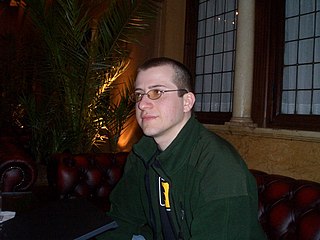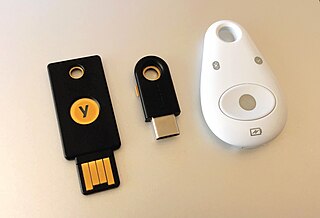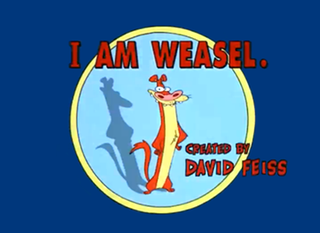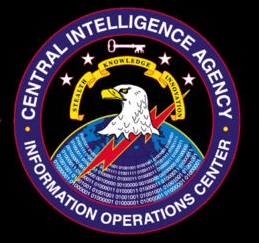Related Research Articles

Jon Lech Johansen, also known as DVD Jon, is a Norwegian programmer who has worked on reverse engineering data formats. He wrote the DeCSS software, which decodes the Content Scramble System used for DVD licensing enforcement. Johansen is a self-trained software engineer, who quit high school during his first year to spend more time with the DeCSS case. He moved to the United States and worked as a software engineer from October 2005 until November 2006. He then moved to Norway but moved back to the United States in June 2007.

iTunes is a media player, media library, and mobile device management utility developed by Apple. It is used to purchase, play, download and organize digital multimedia on personal computers running the macOS and Windows operating systems, and can be used to rip songs from CDs as well as playing content from dynamic, smart playlists. It includes options for sound optimization and wirelessly sharing iTunes libraries.
Copy protection, also known as content protection, copy prevention and copy restriction, is any measure to enforce copyright by preventing the reproduction of software, films, music, and other media.
FairPlay is a family of digital rights management (DRM) technologies developed by Apple Inc. for protecting videos, books and apps and historically for music.
A backdoor is a typically covert method of bypassing normal authentication or encryption in a computer, product, embedded device, or its embodiment. Backdoors are most often used for securing remote access to a computer, or obtaining access to plaintext in cryptosystems. From there it may be used to gain access to privileged information like passwords, corrupt or delete data on hard drives, or transfer information within autoschediastic networks.
Data security means protecting digital data, such as those in a database, from destructive forces and from the unwanted actions of unauthorized users, such as a cyberattack or a data breach.

Live Free or Die Hard is a 2007 American action thriller film directed by Len Wiseman, and serves as the fourth installment in the Die Hard film series. It is based on the 1997 article "A Farewell to Arms" written for Wired magazine by John Carlin. The film's name references New Hampshire's state motto, "Live Free or Die".
Digital distribution, also referred to as content delivery, online distribution, or electronic software distribution, among others, is the delivery or distribution of digital media content such as audio, video, e-books, video games, and other software.

A Hackintosh is a computer that runs Apple's operating system macOS on computer hardware that is not authorized for the purpose by Apple. This is due to the software license for macOS only permitting its use on in-house hardware built by Apple itself, in this case the Mac line.

Extended Copy Protection (XCP) is a software package developed by the British company First 4 Internet and sold as a copy protection or digital rights management (DRM) scheme for Compact Discs. It was used on some CDs distributed by Sony BMG and sparked the 2005 Sony BMG CD copy protection scandal; in that context it is also known as the Sony rootkit.

The Advanced Access Content System (AACS) is a standard for content distribution and digital rights management, intended to restrict access to and copying of the post-DVD generation of optical discs. The specification was publicly released in April 2005. The standard has been adopted as the access restriction scheme for HD DVD and Blu-ray Disc (BD). It is developed by AACS Licensing Administrator, LLC, a consortium that includes Disney, Intel, Microsoft, Panasonic, Warner Bros., IBM, Toshiba and Sony. AACS has been operating under an "interim agreement" since the final specification has not yet been finalized.

The security of Advanced Access Content System (AACS) has been a subject of discussion amongst security researchers, high definition video enthusiasts, and consumers at large since its inception. A successor to Content Scramble System (CSS), the digital rights management mechanism used by commercial DVDs, AACS was intended to improve upon the design of CSS by addressing flaws which had led to the total circumvention of CSS in 1999. The AACS system relies on a subset difference tree combined with a certificate revocation mechanism to ensure the security of high definition video content in the event of a compromise.
Amazon Music is a music streaming platform and digital music store operated by Amazon. As of January 2020, the service had 55 million subscribers.
Digital rights management (DRM) is the management of legal access to digital content. Various tools or technological protection measures (TPM), such as access control technologies, can restrict the use of proprietary hardware and copyrighted works. DRM technologies govern the use, modification and distribution of copyrighted works and of systems that enforce these policies within devices. DRM technologies include licensing agreements and encryption.

A controversy surrounding the AACS cryptographic key arose in April 2007 when the Motion Picture Association of America and the Advanced Access Content System Licensing Administrator, LLC began issuing cease and desist letters to websites publishing a 128-bit (16-byte) number, represented in hexadecimal as 09 F9 11 02 9D 74 E3 5B D8 41 56 C5 63 56 88 C0, a cryptographic key for HD DVDs and Blu-ray Discs. The letters demanded the immediate removal of the key and any links to it, citing the anti-circumvention provisions of the United States Digital Millennium Copyright Act (DMCA).
A digital copy is a commercially distributed computer file containing a media product such as a film or music album. The term contrasts this computer file with the physical copy with which the digital copy is usually offered as part of a bundle. It allows the disc's purchaser to acquire a single copy of the film on a digital device such as a personal computer, smartphone, tablet computer, or digital media player, and view it on those devices without requiring access to the physical media. "Digital copy" is also commonly referred to as "Digital HD".

Multi-factor authentication is an electronic authentication method in which a user is granted access to a website or application only after successfully presenting two or more pieces of evidence to an authentication mechanism. MFA protects personal data—which may include personal identification or financial assets—from being accessed by an unauthorized third party that may have been able to discover, for example, a single password.

I Am Weasel is an American animated television series created by David Feiss for Cartoon Network. It is the fourth of the network's Cartoon Cartoons and the final to be produced solely by Hanna-Barbera. The series centers on I.M. Weasel, a smart, noble and successful weasel, I.R. Baboon, an idiotic and arrogant baboon who is envious of Weasel and acts as both his rival and friend, and the mischievous, flamboyant Red Guy, who returns from Cow and Chicken to antagonize the duo.

A smart speaker is a type of loudspeaker and voice command device with an integrated virtual assistant that offers interactive actions and hands-free activation with the help of one "hot word". Some smart speakers can also act as a smart device that utilizes Wi-Fi and other protocol standards to extend usage beyond audio playback, such as to control home automation devices. This can include, but is not limited to, features such as compatibility across a number of services and platforms, peer-to-peer connection through mesh networking, virtual assistants, and others. Each can have its own designated interface and features in-house, usually launched or controlled via application or home automation software. Some smart speakers also include a screen to show the user a visual response.

Vault 7 is a series of documents that WikiLeaks began to publish on 7 March 2017, detailing the activities and capabilities of the United States Central Intelligence Agency (CIA) to perform electronic surveillance and cyber warfare. The files, dating from 2013 to 2016, include details on the agency's software capabilities, such as the ability to compromise cars, smart TVs, web browsers including Google Chrome, Microsoft Edge, Mozilla Firefox, and Opera, the operating systems of most smartphones including Apple's iOS and Google's Android, and computer operating systems including Microsoft Windows, macOS, and Linux. A CIA internal audit identified 91 malware tools out of more than 500 tools in use in 2016 being compromised by the release. The tools were developed by the Operations Support Branch of the CIA.
References
- ↑ Kahney, Leander (October 21, 2003). "Buck a Song, or Buccaneer?". Wired . Archived from the original on April 11, 2018. Retrieved April 27, 2018.
- ↑ Dean, Katie (May 19, 2005). "Give Your DVD Player the Finger". Wired . Archived from the original on April 11, 2018. Retrieved April 27, 2018.